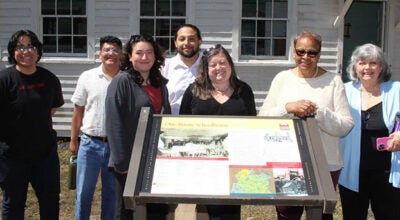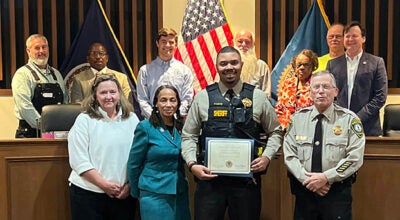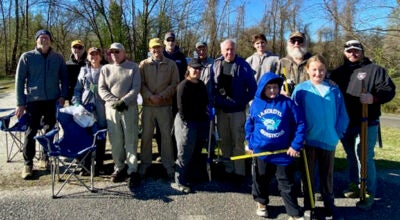Imagine Farmville — Future of health care
Published 6:00 am Friday, May 8, 2020

- A new mural, celebrating caregivers during the COVID-19 pandemic, spans part of a fence outside Centra Southside Community Hospital in Farmville. The mural was designed by Claire Utzinger, a senior art major at Valparaiso University who was set to take the lead on a mural project at school, but the pandemic prevented that from happening. “So this was a really great opportunity for me to be able to lead this mural project for people who are obviously very deserving,” she said. Together with her mother Joy Utzinger and her sister Eve Utzinger, Claire spent 15-16 hours this past weekend painting the mural. (Photo by Titus Mohler)
|
Getting your Trinity Audio player ready...
|
At the start of a new decade, the Farmville area and the world are being hit with a pandemic, the outbreak of the novel coronavirus, that is unlike anything that has occurred in a century and for most peoples’ lives.
As of Wednesday, May 6, in Virginia, there were 19,357 confirmed and 899 probable cases of COVID-19. There have been 690 confirmed and an additional 23 probable deaths stemming from COVID-19 complications, according to data from the Virginia Department of Health.
Health is many peoples’ top priority. Hospitals, practitioners and health care workers are using all of their resources to treat those who are hospitalized and inform people about ways they can protect themselves and others.
This first installment of the Imagine Farmville series explores how health care workers and facilities are faring during the COVID-19 pandemic, looks back into the recent and distant past to understand the evolutions and challenges health care facilities and community members faced and speaks with officials about the work they are doing to create a future where health care continues to be more accessible and prepares for the uncertainties that might lie ahead.
COMMUNITY SUPPORT
The sound of sirens pierced the air the morning of April 23 at Centra Southside Community Hospital (CSCH). It wasn’t a signal of alarm or of an emergency, but of hope.
A procession of decorated vehicles, trucks and buses followed ambulances and a few emergency vehicles, many carrying signs of encouragement for health care workers.
The Health Care Heroes parade, developed by members of the community, was an outpouring of support toward people on the frontlines during the coronavirus pandemic in Farmville.
“There were very few dry eyes in the house after this event,” CSCH Community Engagement and Relations Coordinator Kerry Mossler said in an interview.
“Our caregivers felt so very appreciated and proud to be a part of this community,” Mossler said. “I cannot say ‘thank you’ enough to all of those involved with that event — it was one of the most moving tributes that I have been a part of during my health care career.”
In addition, health care employees have received an outpouring of personal protective equipment (PPE) and hand-made fabric facemasks, Mossler said. YakAttack in Prince Edward built Powered Air-Purifying Respirator (PAPR) shields for health care workers to use.
As community members and organizations transformed concern, fear and resources into support during the parade, health care practitioners in the area are working to do the same.
As of Wednesday, May 6, according to the Virginia Department of Health, 58 confirmed cases had been reported in Prince Edward County. There had been five reported hospitalizations and two deaths. Prevention has been key for health care professionals in the region. CSCH, clinics and numerous health care practices are taking precautions and innovating their practices to protect and provide care to patients.
CSCH established a 15-bed COVID-19 unit for suspected/positive COVID-infected patients that can be rapidly expanded to 46 beds, Mossler said. Those rooms have been converted to negative pressure, an air circulation method that prevents the virus from spreading as health care workers go from room to room.
Drive-by testing is also available at the hospital. CSCH was the second hospital in Virginia to begin administering drive-by testing, Mossler said.
Following Gov. Ralph Northam’s executive order to lift the restriction on elective surgeries, CSCH has begun enabling elective surgeries to take place beginning Monday, May 4, Mossler said, giving COVID-19 testing to patients scheduled for an elective surgery.
Centra Medical Group (CMG) has begun giving telehealth appointments to patients to practice social distancing.
Tammy Wingo, family nurse practitioner and founder of Hope Clinic of Farmville, is providing masks to patients who may not have them, and care to patients in the parking lot who may be too unwell to enter the office.
“Life has changed quite a bit,” Wingo said.
For those with suspected symptoms of COVID-19, Wingo directs them to CSCH for care. The clinic is also distributing PPE such as masks, face shields and sanitizer to other medical practices in the area.
“We don’t want to take away PPE from people who need it,” Wingo said.
In addition to caring for people during the present circumstances, practitioners are also looking toward the future, seeking to enact solutions that make health care more accessible to the community and remedy the challenges residents of the Farmville area face when receiving health care.
‘TRYING TO THINK DIFFERENTLY ABOUT … OUR FUTURE’
During a teleconference Thursday, April 30, Centra CEO Dr. Andy Mueller said Centra’s health care approach may be more innovative post-pandemic.
“There’s no doubt we could use the COVID crisis to accelerate work that we knew we needed to do,” Mueller said.
Prior to the pandemic, Mueller said Centra had not yet invested in a robust telemedicine platform. In the span of weeks, he said the hard work of employees enabled Centra to quickly and effectively provide that service to patients.
“That’s not going to go away,” Mueller said about virtual appointments. “If patients find that that’s convenient and we can safely deliver care … then we’re going to continue to do that.”
He said Centra will continue to prioritize care for patients who need or want to see their physicians face to face.
“Ultimately, at the end of the day, as we talked about within the organization, we believe our just cause is partnering with you to live your best life,” Mueller said.
In line with providing in-person care, Wingo said many of her patients do not have access or experience with technology that would allow for virtual appointments. In addition, there are some pockets of the region without broadband access.
Wingo said the innovation health care professionals are taking on is necessary for the health of the patients.
“Whatever you have to do to adapt (in order) to meet these needs, that’s what you have to do,” Wingo said. “COVID-19 has made that self-evident.”
Mueller said the pandemic has also forced Centra’s internal staff to consider different operating methods. For example, he said in the past there would be organization-wide meetings where hundreds would travel to a central location. The process was often time-consuming.
“Those are some of the things we’re not going to go back to after COVID-19,” Mueller said.
He noted holding those meetings remotely has proven to be a better use of resources and has received more positive feedback from staff.
“We are really trying to think differently about what our future looks like,” he said.
The health care future of Farmville could be one where people could access doctors and receive medical care through the internet, without having to leave home. The implementation of telehealth appointments may have the potential to slow the spread of flu or other communicable diseases. To reach this future, a number of challenges facing medical practices and community members must be addressed.
HEALTH CARE CHALLENGES
These challenges are reflected in the Farmville Area Community Health Needs Assessment (CHNA) developed by Centra and a team of community partners that included area non-profit leaders. The assessment was developed in large part from a survey sent out to residents in the Farmville region who voiced their experiences. The assessment and implementation plan can be found at www.centrahealth.com/CHNA.
According to the assessment and implementation plan, developed in 2018 and adopted in the spring of 2019, there were 920 participants who filled out the health care needs survey. Of the 920 from the seven-county area CSCH serves and elsewhere, 34.9% of the respondents reported residing in Prince Edward County/Town of Farmville.
In response to the assessment question – what do you feel prevents you from getting the services you need? – 48.9% of respondents cited cost as a reason. Other reasons included high co-pay costs (32.68%), long waits for appointments (23.99%), lack of weekend and evening services (23.35%), lack of transportation (13.88%), lack of internet access (10.77%), not liking going to the doctor (10.12%), and not trusting doctors/clinics (3.24%).
The overall health of the region, involving numerous health factors, was also surveyed. To rank the overall health of counties in Virginia, the CHNA used the framework for the County Health Rankings from the University of Wisconsin Population Health Institute and Robert Wood Johnson Foundation County Health Rankings and Roadmaps. These rankings, released annually, measure the health of a community and rank them against all other counties within a state.
All counties in the Farmville region, including Prince Edward, ranked at the bottom 25%. Of 133 counties, Prince Edward ranked 106 in health outcomes (measuring the morbidity, or likelihood of health issues, and mortality) and 97 and in health factors risks (measuring the factors that contribute to chronic illnesses).
Of the 920 respondents surveyed in the region, 40.85% of respondents reported having high blood pressure, 29.10% reported being overweight or obese, 24.18% reported having depression or anxiety, and 21.04% reported having diabetes or high blood sugar.
Tobacco use was reported by 60% of respondents, 39% reported binge drinking on one occasion, and approximately 4% reported illegal drug use.
Retired persons made up 19.1% of the respondents, 43.2% of the population surveyed reported living at or below 200% of the poverty level.
Other concerns reported in the survey were lack of nearby grocery stores or access to fresh produce, and lack of places that support physical activity, such as parks, sidewalks and bike lanes.
Because the health of those in the region doesn’t have one single cause, there will not be one single solution.
According to the CHNA Implementation Plan, strategies to address these issues include evaluating staffing to create more availability for appointments and decrease appointment wait times; expand mental and substance abuse health care; partner with nonprofits to create more awareness and opportunities for healthy living and eating habits; and partner with nonprofits to address transportation shortages.
While gyms are closed and recreation opportunities may be stalled, Betsy Leonard, director of TigerRec at Hampden-Sydney College, Matt McGregor, associate vice president, Wellness & Auxiliary Services at Longwood University, and Stephanie Carwile, certified personal trainer in Farmville, said exercise opportunities can be found at home without purchasing expensive equipment.
“Weeding the garden, mowing the lawn and cleaning the house are also excellent ways to burn some calories,” Leonard said.
Carwile recommended going back to basic exercises, such as squats, pushups, sit-ups, lunges, walking/running, planks, jumping jacks and jump rope.
“They’re all basics, sure, but basics stick around for a reason – they work,” Carwile said.
McGregor and Leonard recommended using nearby outdoor trails such as the High Bridge Trail and taking advantage of free online workout classes. McGregor said numerous free workout routines are on YouTube and can aid with strength training and cardio among other exercises.
“There are many free things available that don’t cost money or require equipment,” McGregor said.
The body is resilient and will adapt, so long as you are moving and giving some attention to your wellness, you are not losing out,” Carwile said.
Leonard said COVID-19 could likely change how some gyms or recreation centers operate.
“People will always be looking for opportunities to stay in shape, but as this pandemic has changed our daily lives so much already, alternative exercise methods may be widely used for quite some time,” Leonard said. “Gyms across the country will reopen with updated procedures that will follow the current guidelines to ensure the safety of members and staff. It will be a long and slow process as social distancing and capacity levels will certainly come into play. This will be new to everyone, and the industry will continue to adapt as it has in recent weeks.”
McGregor said the Longwood Health and Fitness Center will follow guidelines issued by the commonwealth and will work to instill social distancing measures with the center, properly provide staff with gloves and masks, and diligently sanitize equipment.
“There are common sense things we (will) put into operation in the future, and we may find they are more efficient,” McGregor said.
As gyms mandated rigid sanitation guidelines prior to the pandemic, McGregor said the Longwood center and centers around the U.S. are continuing to look at innovative ways to keep people healthy.
While aspects of the future of health care remain in development, there is one certainty. This is not the first time the Farmville region has undergone — and overcome — a widespread illness.
POLIO
In the year 1950, nearly 30 miles outside Farmville in the Town of Dillwyn, Henry Fulcher contracted polio at the age of 12.
According to the World Health Organization, Poliomyelitis, or polio, is a highly infectious virus with symptoms that include fever, muscle stiffness, and in some cases paralysis or death. The epidemic, due to medical research and preventative vaccination treatments, has been considered eliminated in the U.S. for more than 30 years. That, according to the Centers for Disease Control and Prevention (CDC), means there has been no year-round transmission of polio. In the Farmville region, Fulcher remembered Longwood temporarily closing.
Fulcher, a co-owner of radio station WFLO, said in an interview May 1 he remembered first feeling ill at Dillwyn Primary School as a seventh-grade student. He tried to take his teacher’s advice of laying his head on his desk until he felt better, but he couldn’t move his neck.
It was after he couldn’t move his leg that night that his family consulted the town doctor, who diagnosed Fulcher with polio. Fulcher went to the Medical College of Virginia (MCV) in Richmond, where he stayed for months.
Fulcher, like many polio patients, needed to use an iron lung, a machine that aided breathing. Fulcher remembered numerous people in the room with him who also had polio. He remembered a 9-year-old boy across the room from him who died.
Fulcher, as he recovered, shocked the doctors around him who believed he would never walk again by standing and slowly regaining the use of his legs. When his doctors fitted him for crutches, Fulcher said he wouldn’t need them.
“How do you know?” the doctor asked him.
“I just know,” Fulcher said.
Over time, he returned to full mobility.
He wasn’t held back from school, and despite missing most of seventh grade, he joined the eighth-grade class the next year. This was in part due to his speed-reading ability, which Fulcher said he perfected at MCV after reading most of the books the Richmond Library would bring to the hospital.
Complications from the illness over his lifetime resulted in two back surgeries.
Fulcher went to work for WFLO in 1956, his dedication and presence over the airways reassuring thousands of listeners over the decades.
Fulcher said in an interview he was glad to see the guidelines put in place to prevent the spread of COVID-19, such as social distancing, hand-washing and avoiding touching one’s face.
“We need to go back to work,” Fulcher said, while making sure those measures are practiced. Fulcher said he believes the economic devastation on families, that people may lose their homes or livelihoods due to a loss of income, may create worse effects than the virus itself.
A SECOND WAVE?
In April, CDC Director Robert Redfield said in an interview with The Washington Post that a second wave of the coronavirus could appear in the winter of 2020-21, potentially coinciding with the flu season and causing a higher number of reported cases and deaths.
If a second wave of coronavirus cases and the reappearance of the flu are part of Farmville’s future, health care professionals are prepared.
While health care professionals are ready for the future, they are taking actions currently to prevent new cases and encourage members of the community to take those same precautions.
“We would ask that the community continue to perform frequent handwashing, follow social distancing requirements, and to wear a mask if they have to be out in public,” Mossler said. “We would also remind everyone that the hospital is one of the safest places you can be and that if you are sick or in need of medical attention, you should come and be seen. People still need to take care of themselves and the end of this is likely months away.”





